小学语法讲解--一般将来时态练习题
小学英语语法专题训练:一般将来时(含答案)
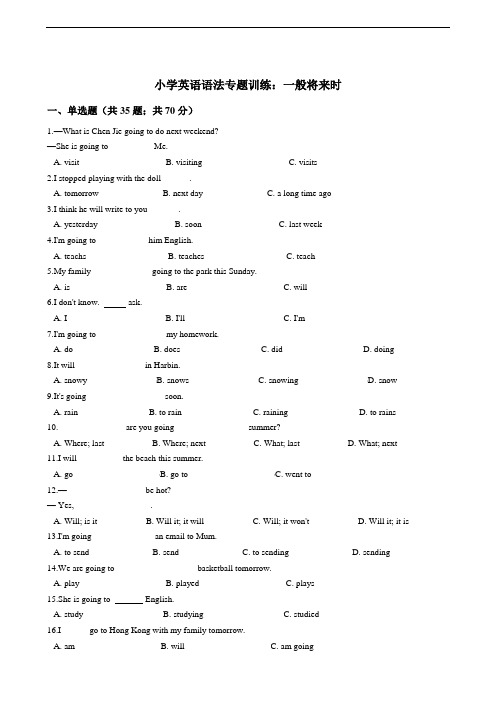
小学英语语法专题训练:一般将来时一、单选题(共35题;共70分)1.—What is Chen Jie going to do next weekend?—She is going to __________Me.A. visitB. visitingC. visits2.I stopped playing with the doll ______.A. tomorrowB. next dayC. a long time ago3.I think he will write to you_______.A. yesterdayB. soonC. last week4.I'm going to ___________ him English.A. teachsB. teachesC. teach5.My family _____________ going to the park this Sunday.A. isB. areC. will6.I don't know. ask.A. IB. I'llC. I'm7.I'm going to _______________ my homework.A. doB. doesC. didD. doing8.It will _______________ in Harbin.A. snowyB. snowsC. snowingD. snow9.It's going _________________ soon.A. rainB. to rainC. rainingD. to rains10._______________ are you going ________________ summer?A. Where; lastB. Where; nextC. What; lastD. What; next11.I will __________the beach this summer.A. goB. go toC. went to12.— _________________ be hot?— Yes, _________________.A. Will; is itB. Will it; it willC. Will; it won'tD. Will it; it is13.I'm going______________ an email to Mum.A. to sendB. sendC. to sendingD. sending14.We are going to __________________ basketball tomorrow.A. playB. playedC. plays15.She is going to English.A. studyB. studyingC. studied16.I ______go to Hong Kong with my family tomorrow.A. amB. willC. am going17.Wang Bing is going to ______some fruit.A. bringB. bringsC. brought18.She is going to _____ in the river.A. swimB. swamC. swimsD. swimming19.We're going to ______________ a baseball game.A. haveB. hadC. has20.It will in Sanya.A. warmB. sunC. be warm21.The seeds are bad and will never ____________________.A. sproutsB. sproutingC. sprout22.I'm going to________art lesson.A. having aB. have anC. have a23.—When are you going to Beijing?—.A. Last weekendB. This weekendC. Yesterday24.One day I _______ visit the moon.A. amB. /C. am going to25.It will ___________ in Xi'an tomorrow.A. windyB. be windyC. be snow26.We're going to __________Chinese.A. speakingB. speakC. speaksD. making27.There _________________ a strong wind along the sea the day after tomorrow.A. isB. areC. will be28.What John do with you this afternoon?A. isB. doesC. will29.We are going to ______________ our primary school.A. leaveB. leavesC. leaving30.I'll _______ it forever.A. keepB. keepsC. kept31.I will _____________ you.A. missingB. missesC. miss32.We _______ have a baseball team.A. be going toB. are going toC. is going to33.It is going to be _________.A. sunB. sunnyC. snow34.We _______ have a picnic this Sunday.A. am going toB. is going toC. are going to35.Look! It's going to __________ soon.A. rainyB. rainC. raining二、选词填空(词汇运用)(共4题;共4分)36.Someday she will________ (visit/visits) America with her family.37.It will ________ (snow/ snowy) in Beijing.38.We ________ (are going to have/ have) a farewell party next Saturday afternoon.39.She will ________ (meet/ meeting) her friends in the park.三、语法填空(共11题;共11分)40.They________ (visit) their grandparents next weekend.41.I am________ (go) to the park.42.What will you ________ (do) tomorrow?43.He will ________(is) a farmer.44.I will________(remember) you forever.45.We________(buy) some delicious food tomorrow. What about you?46.They ________(come)to the airport to meet their friend, Tom next Monday.47.Nancy________ (take) part in a sports meeting next week.48.Kitty is arriving on Sunday, the ________ (five) of January.49.Dong Hao ________ (write) letters to his friends tomorrow.50.We're going to________some pictures in Renmin Park(draw).答案解析部分一、单选题1.【答案】A【考点】一般将来时,动词原形【解析】【分析】句意:—陈杰下周末打算做什么?—她打算来……我。
(完整版)一般将来时态讲解及练习和答案
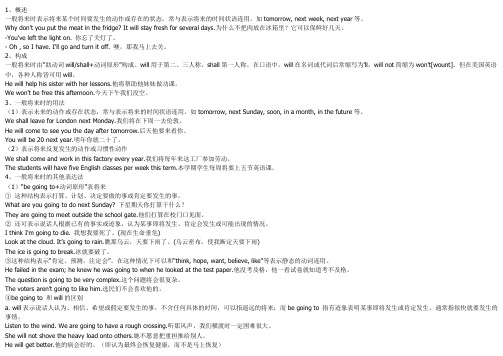
1、概述一般将来时表示将来某个时间要发生的动作或存在的状态,常与表示将来的时间状语连用,如tomorrow, next week, next year等。
Why don’t you put the meat in the fridge? It will stay fresh for several days.为什么不把肉放在冰箱里?它可以保鲜好几天。
-You've left the light on. 你忘了关灯了。
- Oh , so I have. I'll go and turn it off. 噢,那我马上去关。
2、构成一般将来时由“助动词will/shall+动词原形”构成。
will用于第二、三人称,shall第一人称。
在口语中,will在名词或代词后常缩写为'll,will not简缩为won’t[wount]。
但在美国英语中,各种人称皆可用will。
He will help his sister with her lessons.他将帮助他妹妹做功课。
We won't be free this afternoon.今天下午我们没空。
3、一般将来时的用法(1)表示未来的动作或存在状态,常与表示将来的时间状语连用,如tomorrow, next Sunday, soon, in a month, in the future等。
We shall leave for London next Monday.我们将在下周一去伦敦。
He will come to see you the day after tomorrow.后天他要来看你。
You will be 20 next year.明年你就二十了。
(2)表示将来反复发生的动作或习惯性动作We shall come and work in this factory every year.我们将每年来这工厂参加劳动。
六年级英语一般将来时特殊用法练习题50题含答案解析

六年级英语一般将来时特殊用法练习题50题含答案解析1.We will go for a picnic if it _____ sunny tomorrow.A.isB.will beC.wasD.would be答案解析:A。
在if 引导的条件状语从句中,用一般现在时表示将来,所以选A。
B 选项will be 不能用于条件状语从句中的“主将从现”;C 选项was 是过去式,不符合题意;D 选项would be 是过去将来时,也不符合条件状语从句的用法。
2.It _____ rain tomorrow. I'm not sure.A.mayB.mightC.mustD.can答案解析:A。
may 和might 都表示可能性较小的推测,must 表示肯定的推测,can 表示能力或可能性。
根据“I'm not sure”可知是不太确定的推测,may 比might 的可能性稍大一些,所以选A。
3.The weather report says it _____ be cloudy tomorrow.A.willB.shallC.is going to答案解析:C。
be going to 表示根据某种迹象表明要发生某事,这里weather report 是一种迹象,所以选C。
will 表示单纯的将来;shall 一般用于第一人称;would 是过去将来时,都不符合题意。
4.Tom thinks he _____ pass the exam.A.willB.canC.mustD.should答案解析:A。
表示汤姆认为他将会通过考试,用will 表示将来,所以选A。
can 表示能力;must 表示必须;should 表示应该,都不符合题意。
5.They _____ have a party next week.A.willB.are going toC.wouldD.can答案解析:B。
表示有计划、有准备的将来用be going to,这里他们有party 应该是有计划的,所以选B。
小学一般将来时练习试题包括答案解析

小学一般未来时练习题及答案一般未来时一般未来时主要有以下几种表现形式:由助动词 shall或will加动词原形组成,shall用于第一人称, will用于第二、三人称。
除英外国的说英语的国家,在陈说句中,即便在第一人称一般也用will,在英国也有这种趋向。
在口语中,常用shall, will的缩写形式为’ll,如: I’ ll, you’ ll等。
Shall not的缩写式为:shan’t, will not的缩写式为:won’ t.一定句:I/We shall/will go.You/He/She/They Will go.否认句:I/We shall/will not go.You/He/She/They Will not go.疑问句:Shall I/we goWill you/he/she/they go什么叫做一般未来时一般未来时表示将要发生的动作或状况。
比如:I will arrive tomorrow.我明日到。
Will you be free tonight你今夜有空吗We won’ t be busy this evening.我们今夜不忙。
在一般未来时的句子中,有时有表示未来时间的状语,有时没有时间状语,这时要从意思上判断能否指未来的动作或状况。
比如:Will she come她来吗We’ ll only stay for two weeks.我们只待两礼拜。
The meeting won’ t last long.会开不了多久。
在以第一人称I 或we 作主语的问句中,一般使用助动词 shall ,这时或是征采对方的建议,或是咨询一个状况:a. Where shall we meet我们在哪儿碰头b. Shall we have any classes tomorrow明日我们有课吗will,特别是在在这种问句中,最近几年来也有许多人用美国。
比如:How will I get there我怎么去be going to+动词原形a.表示打算、准备做的事。
六年级英语一般将来时句型练习题40题含答案解析

六年级英语一般将来时句型练习题40题含答案解析1.She is going to________a book tomorrow.A.readB.readsC.reading答案解析:A。
“be going to”后面跟动词原形,选项B 是第三人称单数形式,选项C 是动名词形式,只有选项A 是动词原形。
2.They are going to________a picnic this weekend.A.haveB.hasC.having答案解析:A。
“be going to”后面跟动词原形,选项B 是第三人称单数形式,选项C 是动名词形式,只有选项A 是动词原形。
3.I am going to________my homework tonight.A.doB.doesC.doing答案解析:A。
“be going to”后面跟动词原形,选项B 是第三人称单数形式,选项C 是动名词形式,只有选项A 是动词原形。
4.We are going to________a movie next Sunday.A.seeB.sees答案解析:A。
“be going to”后面跟动词原形,选项B 是第三人称单数形式,选项C 是动名词形式,只有选项A 是动词原形。
5.He is going to________a football match tomorrow.A.watchB.watchesC.watching答案解析:A。
“be going to”后面跟动词原形,选项B 是第三人称单数形式,选项C 是动名词形式,只有选项A 是动词原形。
6.My sister is going to________a birthday party next week.A.haveB.hasC.having答案解析:A。
“be going to”后面跟动词原形,选项B 是第三人称单数形式,选项C 是动名词形式,只有选项A 是动词原形。
六年级英语一般将来时特殊用法练习题50题答案解析版

六年级英语一般将来时特殊用法练习题50题答案解析版1. My family ______ to the park this Sunday.A. goB. goesC. are goingD. is going答案解析:C。
在一般将来时中,be going to结构表示计划、打算做某事。
这里的family强调家庭成员,是复数概念,所以be动词用are。
A选项go是一般现在时,不符合句子语境。
B选项goes是一般现在时的第三人称单数形式,也不符合。
D选项is going,这里的family不是作为一个整体的单数概念,所以不能用is。
2. There ______ a school sports meeting next week.A. will haveB. is going to haveC. will beD. are going to be答案解析:C。
表示存在“有”的一般将来时结构是there will be或者there is/are going to be。
这里a school sports meeting是单数,所以用there will be。
A和B选项中have表示“拥有”,不能和there搭配表示存在关系。
D选项are going to be用于复数主语,不符合本题。
3. She ______ her grandparents tomorrow.A. visitB. visitsC. is going to visitD. will visits答案解析:C。
be going to表示计划做某事,这里表示她计划明天去看望她的祖父母。
A选项visit是一般现在时,不符合语境。
B选项visits是一般现在时第三人称单数形式。
D选项will后面要用动词原形visit,而不是visits。
4. We ______ a party for my sister's birthday tonight.A. haveB. hadC. are havingD. will having答案解析:C。
一般将来时讲解及练习(含答案)
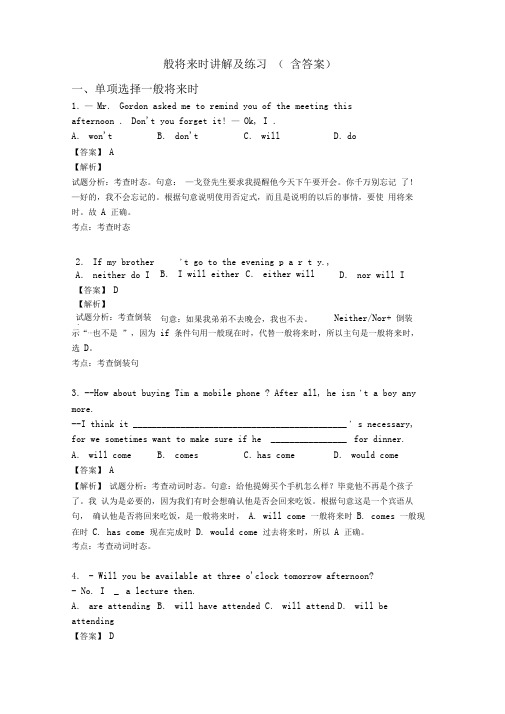
般将来时讲解及练习(含答案)一、单项选择一般将来时1.—Mr.Gordon asked me to remind you of the meeting thisafternoon .Don't you forget it! —Ok, I .A.won't B.don't C.will D.do【答案】A【解析】试题分析:考查时态。
句意:—戈登先生要求我提醒他今天下午要开会。
你千万别忘记了!—好的,我不会忘记的。
根据句意说明使用否定式,而且是说明的以后的事情,要使用将来时。
故A 正确。
考点:考查时态2.If my brother doesn 't go to the evening p a r t y.,A.neither do I B.I will either C.either willI D.nor will I【答案】D 【解析】试题分析:考查倒装句:句意:如果我弟弟不去晚会,我也不去。
Neither/Nor+ 倒装句,表示“⋯也不是”,因为if 条件句用一般现在时,代替一般将来时,所以主句是一般将来时,选D。
考点:考查倒装句3.--How about buying Tim a mobile phone ? After all, he isn 't a boy any more.--I think it _____________________________________________ ' s necessary, for we sometimes want to make sure if he ________________ for dinner. A.will come B.comes C.has come D.would come【答案】A【解析】试题分析:考查动词时态。
句意:给他提姆买个手机怎么样?毕竟他不再是个孩子了。
我认为是必要的,因为我们有时会想确认他是否会回来吃饭。
小学英语:全面解析一般将来时语法时态

全面解析:一般将来时1.Is your sister going to ________?A.swam B.swimming C.swim全面解析:你的妹妹打算去吗?A游泳,动词过去式;B游泳,动词ing形式;C游泳,动词原形,本句是一般将来时,构成be going to+动词原形。
故选C。
2.Joy is ________ to have a party.A.goes B.go C.going全面解析:Joy.....举行一场聚会。
be going to结构“打算做某事”,构成一般将来时。
故答案为:C。
3.Charlie _______ here next month.A.isn't working B.doesn't workingC.isn't going to working D.won't work全面解析:查理下个月将不在这里上班。
next month表示下个月,句子时态用一般将来时态,谓语部分应是will do结构或be going to do结构,否定句在will或be后加not。
A. isn't working结构错误,不符合题意,B. doesn't working结构错误,不符合题意,C. isn't going to working结构错误,不符合题意,D. won't work将不会工作,符合题意。
故选D。
4.She ____study Science.A.is going B.going to C.is going to D.is go to全面解析:她打算学科学。
be going to+动词原形,构成一般将来时,故选C。
5.After school, we camping.A.are going to go B.going to go C.go to全面解析:放学后,我们野营。
A选项是be going to结构,用在这里正确;B选项如果用在这里,缺少be动词。
小学语法专题解析:一般将来时常考题
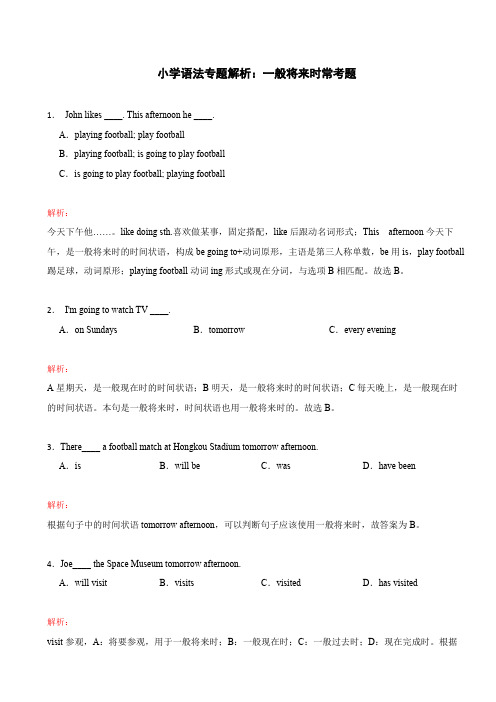
小学语法专题解析:一般将来时常考题1.John likes ____. This afternoon he ____.A.playing football; play footballB.playing football; is going to play footballC.is going to play football; playing football解析:今天下午他……。
like doing sth.喜欢做某事,固定搭配,like后跟动名词形式;This afternoon今天下午,是一般将来时的时间状语,构成be going to+动词原形,主语是第三人称单数,be用is,play football 踢足球,动词原形;playing football动词ing形式或现在分词,与选项B相匹配。
故选B。
2.I'm going to watch TV ____.A.on Sundays B.tomorrow C.every evening解析:A星期天,是一般现在时的时间状语;B明天,是一般将来时的时间状语;C每天晚上,是一般现在时的时间状语。
本句是一般将来时,时间状语也用一般将来时的。
故选B。
3.There____ a football match at Hongkou Stadium tomorrow afternoon.A.is B.will be C.was D.have been解析:根据句子中的时间状语tomorrow afternoon,可以判断句子应该使用一般将来时,故答案为B。
4.Joe____ the Space Museum tomorrow afternoon.A.will visit B.visits C.visited D.has visited解析:visit参观,A:将要参观,用于一般将来时;B:一般现在时;C:一般过去时;D:现在完成时。
根据句中的tomorrow afternoon可知,本句的时态应为一般将来时,一般将来时的结构为"will+动词原形"。
六年级英语一般将来时特殊用法练习题50题(带答案)
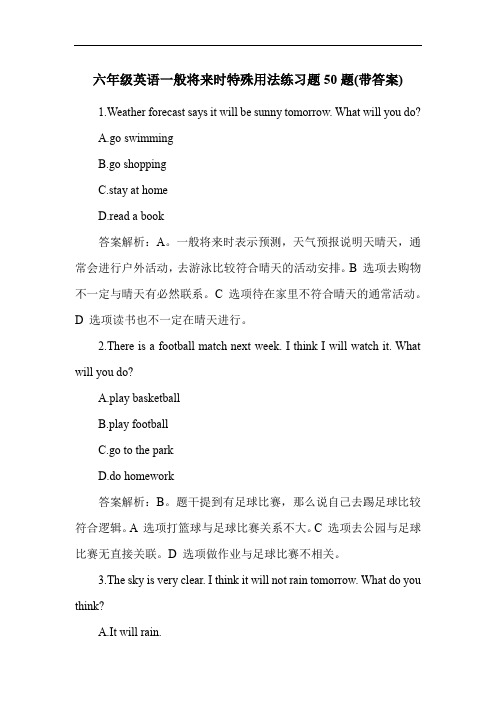
六年级英语一般将来时特殊用法练习题50题(带答案)1.Weather forecast says it will be sunny tomorrow. What will you do?A.go swimmingB.go shoppingC.stay at homeD.read a book答案解析:A。
一般将来时表示预测,天气预报说明天晴天,通常会进行户外活动,去游泳比较符合晴天的活动安排。
B 选项去购物不一定与晴天有必然联系。
C 选项待在家里不符合晴天的通常活动。
D 选项读书也不一定在晴天进行。
2.There is a football match next week. I think I will watch it. What will you do?A.play basketballB.play footballC.go to the parkD.do homework答案解析:B。
题干提到有足球比赛,那么说自己去踢足球比较符合逻辑。
A 选项打篮球与足球比赛关系不大。
C 选项去公园与足球比赛无直接关联。
D 选项做作业与足球比赛不相关。
3.The sky is very clear. I think it will not rain tomorrow. What do you think?A.It will rain.B.It will be cloudy.C.It will be sunny.D.It will snow.答案解析:C。
天空很清晰,通常预示着晴天。
A 选项与题干中不会下雨但不一定会下雨矛盾。
B 选项与天空清晰不符。
D 选项没有任何迹象表明会下雪。
4.Mom says we will go on a picnic if it is fine on Sunday. What will you take?A.booksB.toysC.foodD.pens答案解析:C。
去野餐通常会带食物。
小学英语100例:全面解析一般将来时语法时态
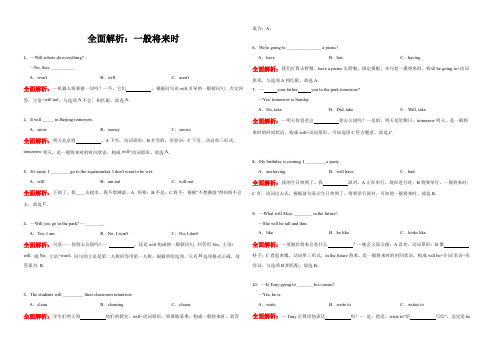
全面解析:一般将来时1.—Will robots do everything?—No, they __________.A.won't B.will C.aren't全面解析:—机器人将要做一切吗?—不,它们。
根据问句由will引导的一般疑问句,否定回答,主语+will not,与选项A不会,相匹配。
故选A.2.It will _____ in Beijing tomorrow.A.snow B.snowy C.snows全面解析:明天北京将。
A下雪,动词原形;B多雪的,形容词;C下雪,动词单三形式,tomorrow明天,是一般将来时的时间状语,构成will+动词原形。
故选A。
3.It's rainy. I ________ go to the supermarket. I don't want to be wet.A.will B.am not C.will not全面解析:下雨了。
我____去超市。
我不想淋湿。
A. 将要;B.不是;C.将不;根据“不想淋湿”得知将不会去,故选C。
4.—Will you go to the park? —________.A.Yes, I am B.No, I won't C.No, I don't全面解析:句意: — 你将去公园吗? — 。
这是will构成的一般疑问句, 回答用Yes, 主语+ will. 或No, 主语+won't. 问句的主语是第二人称回答用第一人称。
根据所给选项,只有B选项格式正确。
故答案为: B.5.The students will _________ their classroom tomorrow.A.clean B.cleaning C.cleans全面解析:学生们明天将他们的教室。
will+动词原形,将要做某事,构成一般将来时。
故答案为:A。
6.We're going to _______________ a picnic!A.have B.has C.having全面解析:我们打算去野餐。
小学英语一般将来时练习

小学英语一般将来时练习在小学英语教学中,一般将来时是一个重要的时态,它用来描述将来要发生的动作或状态。
以下是一些练习题,帮助学生掌握一般将来时的用法:1. 填空题:- 明天是周末,我打算去图书馆。
- Tomorrow is Saturday, I ___ ___ to the library.(答案:am going)2. 改错题:- He will watches a movie tonight.- He ___ a movie tonight.(答案:watches 改为 watches)3. 选择题:- What are you doing this weekend?- A. I am going to play football.- B. I play football.- C. I played football.- D. I will play football.(答案:A)4. 翻译题:- 他们计划下周去海边度假。
- They ___ ___ ___ a holiday by the sea next week.(答案:are planning to take)5. 连词成句:- will, we, a, have, party, next, Saturday- We will have a party next Saturday.6. 写作练习:- 写一篇关于你未来计划的短文,不少于5句话。
- 例如:I am going to learn how to play the guitar next year. I will join a music class and practice every day.7. 对话练习:- A: What are you going to do after school?- B: I am going to the bookstore to buy a new storybook.8. 动词填空:- I ___ (visit) my grandparents next month.(答案:will visit)9. 情景模拟:- 假设你是一名天气预报员,描述明天的天气情况。
四年级英语一般将来时练习40题
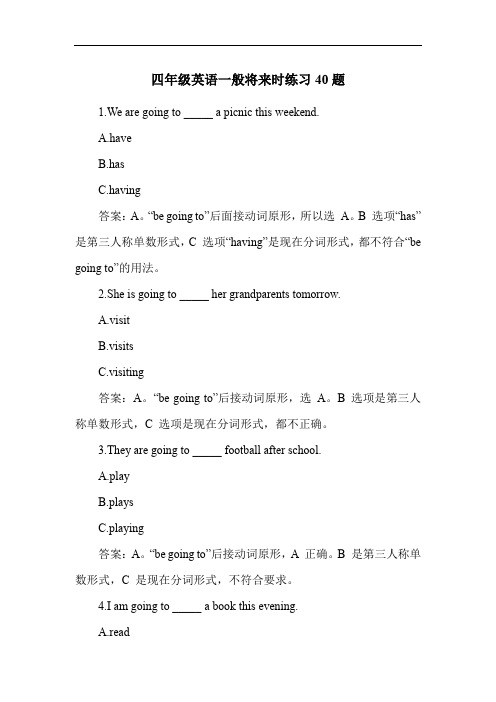
四年级英语一般将来时练习40题1.We are going to _____ a picnic this weekend.A.haveB.hasC.having答案:A。
“be going to”后面接动词原形,所以选A。
B 选项“has”是第三人称单数形式,C 选项“having”是现在分词形式,都不符合“be going to”的用法。
2.She is going to _____ her grandparents tomorrow.A.visitB.visitsC.visiting答案:A。
“be going to”后接动词原形,选A。
B 选项是第三人称单数形式,C 选项是现在分词形式,都不正确。
3.They are going to _____ football after school.A.playB.playsC.playing答案:A。
“be going to”后接动词原形,A 正确。
B 是第三人称单数形式,C 是现在分词形式,不符合要求。
4.I am going to _____ a book this evening.A.readB.readsC.reading答案:A。
“be going to”后接动词原形,选A。
B 是第三人称单数形式,C 是现在分词形式,错误。
5.We are going to _____ swimming next Sunday.A.goB.goesC.going答案:A。
“be going to”后接动词原形,A 正确。
B 是第三人称单数形式,C 是现在分词形式,不对。
6.He is going to _____ a movie tonight.A.seeB.seesC.seeing答案:A。
“be going to”后接动词原形,选A。
B 是第三人称单数形式,C 是现在分词形式,不符合。
7.They are going to _____ shopping on Saturday.A.goB.goesC.going答案:A。
小学语法专题:一般将来时全练全析

小学语法专题:一般将来时全练全解析1.— What are you ____ to do this afternoon?— I am going to play basketball.A.go B.going C.goes全解析:根据我打算去打篮球可知问句问打算干什么?打算做某事be going to do,故答案为B。
2.Our friends ______ tomorrow morning.A.goes sightseeing B.went sightseeing C.will go sightseeing全解析:故选C。
3.—____ are you ____ tomorrow?—I am going to the post office.A.What; going B.Where; going C.Where; going to全解析:根据答语可知询问地点,用Where哪里进行提问,What什么,be going to do sth.打算做某事,where 是疑问副词,不加to,故选B。
4.Will you go to the zoo ___________________ Sunday?A.last B.next C.\全解析:故选B。
5.Tomorrow I'm going to _______ my friends to dinner.A.invite B.invited C.inviting全解析:A邀请,动词原形;B邀请,动词过去式;C正在邀请,现在分词,Tomorrow明天,是一般将来时的时间状语,谓语动词用原形。
故选A。
6.Sarah's mother ________some mooncakes tomorrow.A.is going to make B.makes C.is making全解析:tomorrow明天,是一般将来时的时间状语,构成be going to+动词原形,主语是第三人称单数,be用is,A打算做,用于一般将来时;B做,动词单三形式;C正在做,用于现在进行时。
小学英语一般将来时语法时态练习全面解析

1.My teacher _________my parents this weekend.A.is calling B.will call C.calls全面解析:我的老师这个周末会给我父母。
根据this weeken是一般将来时的时间状语,构成will+动词原形,A 正在打电话,be+现在分词,B打电话,will+动词原形,C打电话,动词三单形式,故选B.2.We will _______ the star on the tree.A.put B.puts C.putting全面解析:我们将要把星星挂在树上。
will将要,其后加动词原形put,故选A。
3.It __________ be windy in Beijing.A.going B.is C.will全面解析:北京将刮风。
本句是一般将来时,构成will be+形容词,与选项C相匹配。
故选C.4.In the future, school will ____ different.A.is B.are C.be全面解析:在将来,学校会有所不同。
本句是一般将来时,will+动词原形,是系表结构will be+形容词,故选C.5.Are you going to ________ tomorrow?A.swims B.swimming C.swim全面解析:明天你打算吗?tomorrow明天,是一般将来时的时间状语,构成be going to后接动词原形。
A游泳,动词单三形式;B游泳,动词ing形式;C游泳,动词原形。
故选C。
6.She is going to after dinner.A.play chess B.plays chess C.playing chess全面解析:晚饭后她要。
A下棋,动词原形;B下棋,动词单三形式;C下棋,是现在分词,本句是一般将来时,构成be going to+动词原形。
故选A。
7.Kitty free next week.A.is B.will be C.will全面解析:基蒂下周有空。
六年级英语一般将来时特殊用法练习题50题带答案解析

六年级英语一般将来时特殊用法练习题50题带答案解析1.There will be a picnic tomorrow. What will the weather be like?A.It will be sunny.B.It will be rainy.C.It will be windy.D.It will be snowy.答案解析:A。
本题考查一般将来时表示预测。
B、C、D 选项也都是可能的天气情况,但题干中说有野餐,通常晴天更适合野餐。
一般将来时will be 后接形容词表示对未来的预测。
2.We are going to the park this weekend. What will we do there?A.We will play basketball.B.We will go swimming.C.We will have a picnic.D.We will read books.答案解析:C。
去公园通常会进行野餐。
A 选项打篮球一般在篮球场;B 选项游泳通常在游泳池;D 选项读书通常在家里或图书馆等安静的地方。
一般将来时be going to do 表示计划或打算做某事,这里根据场景选择更合适的活动。
3.Mom says she will buy a new dress for me. What color will it be?A.It will be red.B.It will be blue.C.It will be green.D.It will be yellow.答案解析:A。
通常红色的裙子比较鲜艳好看,更符合妈妈给孩子买新裙子的预期。
B、C、D 选项也都是可能的颜色,但缺乏一定的合理性。
一般将来时will do 表示将来会发生的动作。
4.Tomorrow is Sunday. What will Tom do?A.He will go to school.B.He will do his homework.C.He will watch TV.D.He will play football.答案解析:D。
六年级英语一般将来时特殊用法练习题50题(答案解析)
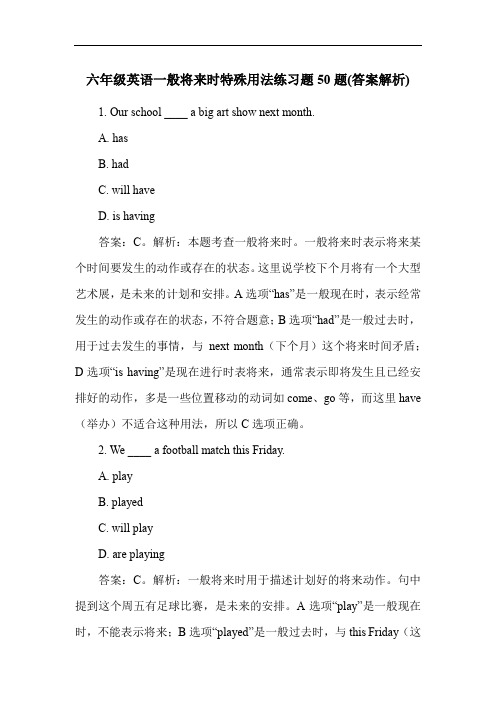
六年级英语一般将来时特殊用法练习题50题(答案解析)1. Our school ____ a big art show next month.A. hasB. hadC. will haveD. is having答案:C。
解析:本题考查一般将来时。
一般将来时表示将来某个时间要发生的动作或存在的状态。
这里说学校下个月将有一个大型艺术展,是未来的计划和安排。
A选项“has”是一般现在时,表示经常发生的动作或存在的状态,不符合题意;B选项“had”是一般过去时,用于过去发生的事情,与next month(下个月)这个将来时间矛盾;D选项“is having”是现在进行时表将来,通常表示即将发生且已经安排好的动作,多是一些位置移动的动词如come、go等,而这里have (举办)不适合这种用法,所以C选项正确。
2. We ____ a football match this Friday.A. playB. playedC. will playD. are playing答案:C。
解析:一般将来时用于描述计划好的将来动作。
句中提到这个周五有足球比赛,是未来的安排。
A选项“play”是一般现在时,不能表示将来;B选项“played”是一般过去时,与this Friday((这个周五)这个将来时间不符;D选项“are playing”是现在进行时表将来,通常用于表示即将发生的动作,如I'm leaving((我就要走了),这里是计划中的足球比赛,用will play更合适,所以C正确。
3. The teacher ____ us a new English song next week.A. teachesB. taughtC. will teachD. is teaching答案:C。
解析:一般将来时用来表示将来计划做的事。
下周老师将教我们一首新的英语歌,是未来的安排。
A选项“teaches”是一般现在时,用于经常发生的动作,不符合这里下周的将来时间;B选项“taught”是一般过去时,不能用于描述将来;D选项“is teaching”是现在进行时表将来,多表示即将发生的动作且通常是位置移动类动词或者是安排好马上要做的事,而这里教歌用will teach更能体现计划,所以C正确。
一般将来时小学语法题及答案
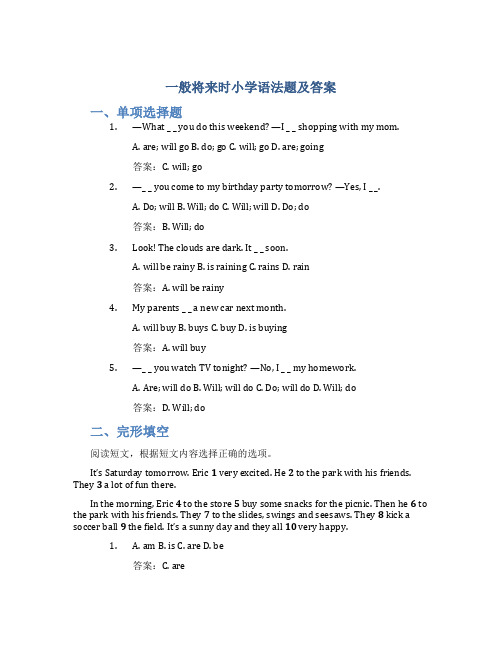
一般将来时小学语法题及答案一、单项选择题1.—What _ _ you do this weekend? —I _ _ shopping with my mom.A. are; will goB. do; goC. will; goD. are; going答案:C. will; go2.—_ _ you come to my birthday party tomorrow? —Yes, I _ _.A. Do; willB. Will; doC. Will; willD. Do; do答案:B. Will; do3.Look! The clouds are dark. It _ _ soon.A. will be rainyB. is rainingC. rainsD. rain答案:A. will be rainy4.My parents _ _ a new car next month.A. will buyB. buysC. buyD. is buying答案:A. will buy5.—_ _ you watch TV tonight? —No, I _ _ my homework.A. Are; will doB. Will; will doC. Do; will doD. Will; do答案:D. Will; do二、完形填空阅读短文,根据短文内容选择正确的选项。
It’s Saturday tomorrow. Eric 1 very excited. He 2 to the park with his friends. They 3 a lot of fun there.In the morning, Eric 4 to the store 5 buy some snacks for the picnic. Then he 6 to the park with his friends. They 7 to the slides, swings and seesaws. They 8 kick a soccer ball 9the field. It’s a sunny day and they all 10 very happy.1. A. am B. is C. are D. be答案:C. are2. A. goes B. go C. went D. going答案:B. go3. A. has B. had C. have D. having答案:C. have4. A. want B. wants C. wanted D. wanting答案:B. wants5. A. but B. and C. or D. so答案:B. and6. A. go B. goes C. going D. to go答案:A. go7. A. play B. plays C. played D. playing答案:A. play8. A. can B. could C. did D. do答案:D. do9. A. on B. at C. to D. in答案:C. to10. A. is B. am C. are D. be答案:C. are三、阅读理解阅读短文,根据短文内容选择正确的选项。
六年级英语一般将来时句型练习题40题(带答案)

六年级英语一般将来时句型练习题40题(带答案)1. I ______ (play) football with my friends tomorrow.A. playB. will playC. playedD. am playing答案:B。
解析:根据句子中的tomorrow可知是将来的时间,一般将来时的结构是will+动词原形,这里表示我明天将和朋友踢足球,所以选B。
2. He ______ to the park next Sunday.A. goesB. wentC. will goD. is going答案:C。
解析:next Sunday是下周日,表示将来的时间,一般将来时用will+动词原形,他下周日将去公园,所以选C。
3. My mother ______ make a cake for my birthday.A. willB. isC. areD. do答案:A。
解析:这里表达妈妈将为我的生日做一个蛋糕,一般将来时结构will+动词原形,所以选A。
4. We ______ see a movie this evening.A. willB. areC. wasD. did答案:A。
解析:this evening今晚,表示将来,一般将来时用will+动词原形,我们今晚将看电影,所以选A。
5. They ______ have a party next week.A. willB. hasC. hadD. have答案:A。
解析:next week下周,表示将来的时间,一般将来时结构为will+动词原形,他们下周将举办一个派对,所以选A。
6. She ______ buy a new dress for the school show.A. willB. isC. wasD. are答案:A。
解析:这里是说她将为学校演出买一条新裙子,将来的动作,一般将来时用will+动词原形,所以选A。
- 1、下载文档前请自行甄别文档内容的完整性,平台不提供额外的编辑、内容补充、找答案等附加服务。
- 2、"仅部分预览"的文档,不可在线预览部分如存在完整性等问题,可反馈申请退款(可完整预览的文档不适用该条件!)。
- 3、如文档侵犯您的权益,请联系客服反馈,我们会尽快为您处理(人工客服工作时间:9:00-18:30)。
一般将来时态练习题
( ) 1. There __________ a meeting tomorrow afternoon.
A. will be going to
B. will going to be
C. is going to be
D. will go to be
( ) 2. Charlie ________ here next month.
A. isn’t working
B. doesn’t working
C. isn’t going to working
D. won’t work
( ) 3. He ________ very busy this week, he ________ free next week. A. will be; is B. is; is
C. will be; will be
D. is; will be
( ) 4. There ________ a dolphin show in the zoo tomorrow evening. A. was B. is going to have
C. will have
D. is going to be
( ) 5. –________ you ________ free tomorrow?
– No. I ________ free the day after tomorrow.
A. Are; going to; will
B. Are; going to be; will
C. Are; going to; will be
D. Are; going to be; will be
( ) 6. Mother ________ me a nice present on my next birthday.
A. will gives
B. will give
C. gives
D. give
( ) 7. – Shall I buy a cup of tea for you?
–________. (不,不要。
)
A. No, you won’t.
B. No, you aren’t.
C. No, please don’t.
D. No, please.
( ) 8. – Where is the morning paper?
– I ________ if for you at once.
A. get
B. am getting
C. to get
D. will get
( ) 9. ________ a concert next Saturday?
A. There will be
B. Will there be
C. There can be
D. There are
( ) 10. If they come, we ________ a meeting.
A. have
B. will have
C. had
D. would have
( ) 11. He ________ her a beautiful hat on her next birthday.
A. gives
B. gave
C. will giving
D. is going to giving
( ) 12. He ________ to us as soon as he gets there.
A. writes
B. has written
C. will write
D. wrote
( ) 13. He ________ in three days.
A. coming back
B. came back
C. will come back
D. is going to coming back ( ) 14. If it ________ tomorrow, we’ll go roller-skating.
A. isn’t rain
B. won’t rain
C. doesn’t rain
D. doesn’t fine
( ) 15. – Will his parents go to see the Terra Cotta Warriors tomorrow?
– No, ________ (不去).
A. they willn’t.
B. they won’t.
C. they aren’t.
D. they don’t.
( ) 16. Who ________ we ________ swimming with tomorrow afternoon?
A. will; go
B. do; go
C. will; going
D. shall; go
( ) 17. We ________ the work this way next time.
A. do
B. will do
C. going to do
D. will doing
( ) 18. Tomorrow he ________ a kite in the open air first, and then ________ boating in the park.
A. will fly; will go
B. will fly; goe
C. is going to fly; will goes
D. flies; will go
( ) 19. The day after tomorrow they ________ a volleyball match.
A. will watching
B. watches
C. is watching
D. is going to watch
( ) 20. There ________ a birthday party this Sunday.
A. shall be
B. will be
C. shall going to be
D. will going to be
( ) 21. They ________ an English evening next Sunday.
A. are having
B. are going to have
C. will having
D. is going to have
( ) 22. ________ you ________ free next Sunday?
A. Will; are
B. Will; be
C. Do; be
D. Are; be
( ) 23. He ________ there at ten tomorrow morning.
A. will
B. is
C. will be
D. be
( ) 24. ________ your brother ________ a magazine from the library?
A. Are; going to borrow
B. Is; going to borrow
C. Will; borrows
D. Are; going to borrows
( ) 25. – Shall I come again tomorrow afternoon?
–________ (好的).
A. Yes, please
B. Yes, you will.
C. No, please.
D. No, you won’t.
( ) 26. It ________ the year of the horse next year.
A. is going to be
B. is going to
C. will be
D. will is
( ) 27. ________ open the window?
A. Will you please
B. Please will you
C. You please
D. Do you
( ) 28. –Let’s go out to play football, shall we?
– OK. I ________.
A. will coming
B. be going to come
C. come
D. am coming
( ) 29. It ________ us a long time to learn English well.
A. takes
B. will take
C. spends
D. will spend
( ) 30. The train ________ at 11.
A. going to arrive
B. will be arrive
C. is going to
D. is arriving。
